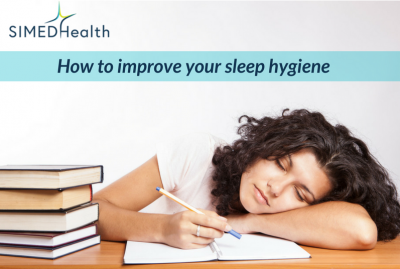
We all know what it feels like when you don’t get enough sleep. You’re sluggish, yawning, drowsy and reaching for an extra cup of coffee throughout the day. Although for some of us, the sleep troubles don’t stop there.
According to SIMEDHealth’s medical director for sleep medicine, Dr. Galina Bogorodskaya, it may not be that you’re not getting enough sleep, but rather you’re not getting enough good sleep.
Have you or your partner noticed any of these symptoms?
- Loud or frequent snoring
- Not breathing during sleep
- Choking or gasps sounds
- Kicking during sleep
- Violent behavior during sleep
- Walking or talking during sleep
- Morning headaches
- Daytime sleepiness or fatigue
- Awakening with dry mouth and sore throat
Not only do these symptoms indicate a possible sleep condition, they can prevent you from feeling refreshed and prepared for your day. You may even find you’re more irritable than usual when you aren’t getting proper sleep, Dr. Bogorodskaya said.
“Most people think you need 8 hours of sleep a night, and while that is the average, some people need 5 [hours], some people need 9. This all depends on your sleep hygiene,” Dr. Bogorodskaya said.
Sleep hygiene refers to personal habits and practices which allow you to sleep well on a regular basis. According to Dr. Bogorodskaya, to have proper sleep hygiene you should avoid:
- Using alcohol before sleep
- Eating 2-3 hours before sleep
- Using stimulants or taking any medications with caffeine before sleep
- Exercising before sleep
- Sleeping with pets
- Exposure to bright light before sleep
- Watching TV or using social media before sleep
As you make adjustments to your sleep routine, Dr. Bogorodskaya said it’s important to make sure your bedroom has enough cool air and very little to no light, and most importantly, to be self-aware.
“Just pay attention to not only how you’re sleeping, but ask yourself how you feel throughout the day. Do you feel refreshed, satisfied, and ready for the day? Are you at your full activity level? Sometimes people think their drowsiness is a lack of vitamins, exercise, or something else, but can be related to sleep,” she said.
Memory and concentration problems may also be aided by improving sleep hygiene and taking power naps, said Dr. Bogorodskaya. A 20-30 minute power nap can leave you feeling refreshed and ready to take on the remainder of your day.
When we sleep, our brains reset, our tissue is repaired, our appetite is regulated and we, in turn, are prepared to take on life to the fullest. If you feel you aren’t getting proper rest, speak with your primary care doctor about a referral to the SIMEDHealth Sleep Center, so that you can get back to feeling like you.